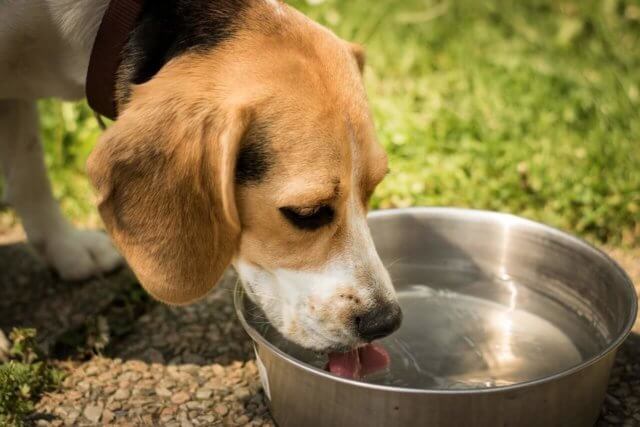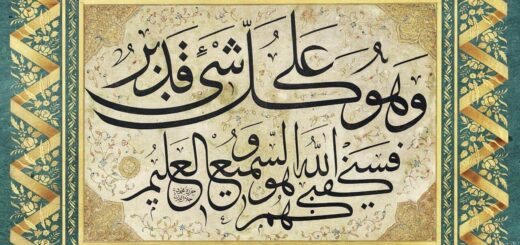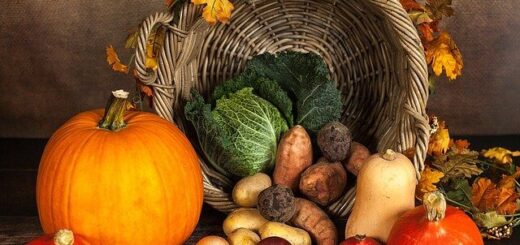Dog days are over?

Getting your Trinity Audio player ready...
|
The article presented here is an adaptation of Appendices 3 and 4 from the major study entitled ‘Permissibility or Impermissibility of Foods: A ruling application for guidance concerning the permissibility or impermissibility of foods where they contain alcohol and / or animal products,’ by Professor Muḥammad ibn Abdullah al-Mas’ari. That study was originally undertaken for a major pharmaceutical company and its unique research findings run to several hundred pages in length. An excerpt of the summary and central conclusions has been published previously and is available here for perusal.
A psychological aversion to dogs and the perception that they are inherently impure (najis) seems to be concept that has taken quite deep roots within the Muslim psyche. Built up over generations, this aversion tends to manifest itself in at times alarmist behaviour in the presence of a dog, or viewing anything it may touch as requiring immediate cleaning.
The analysis here builds upon the core concepts of the study as it relates to matters of purity and impurity. It also explores an alternate way to understand the textual evidences as they are reported, and with regard to its wider context. These sections have been expanded to include other previously unpublished material as well as providing a complete translation of two sections upon the same topic from al-Muḥalla bil’Athār by Ibn Ḥazm. Enclosed within that, is some additional referencing and commentary.
Ardent followers of the legal schools may object to certain findings that have been set out in this study, particularly the followers of Imām Shāfi’i as well as Imām Abu Ḥanifah. These objections invariably arose concerning the interpretation of the established ḥadith reported from the Prophet peace and blessings be upon him, where the injunction was made to wash a vessel or container seven-times after it has been licked by a dog. The injunction(s) further specify to make one of those seven with earth or sand and to discard the contents.
It would seem, from the lines of reasoning that they adopted, that they construed the effective cause of this ruling to be that either the dog in and of itself, and / or its saliva was something ritually impure (najis). However, if water is contained within the utensil or container, it doesn’t make that water impure because it has come into contact with a dog’s saliva. Even if one were, for the sake of argument, to adopt the view that the saliva of the dog is ‘a powerful impurity’ as some have argued, that doesn’t mean that the water itself would altogether become impure. It is not possible to separate the saliva of the dog from the water. That saliva on its own doesn’t denote any unique smell or colour.
Indeed, wavering upon this issue and inherently contradictory positions that have been adopted by certain previous scholars demonstrate that such derived conclusions cannot of themselves be construed on par with the revelation of Allah. The verse that has been revealed is unequivocal, the revelation is not inherently contradictory:
أَفَلَا يَتَدَبَّرُونَ الْقُرْآنَ وَلَوْ كَانَ مِنْ عِندِ غَيْرِ اللَّهِ لَوَجَدُوا فِيهِ اخْتِلَافًا كَثِيرًا
Do they not then ponder on the Qur’ān? And if it were from any other than Allah, they would have found in it many contradictions. [4: 82]
Evidences
Various narrations are widely reported in the corpus of aḥādith. For example, the following authentic traditions are cited in the Ṣaḥīḥ of Imām Muslim:
وحدثنا زهير بن حرب حدثنا إسماعيل بن إبراهيم عن هشام بن حسان عن محمد بن سيرين عن أبي هريرة، قال قال رسول الله صلى الله عليه وسلم طهور إناء أحدكم إذا ولغ فيه الكلب أن يغسله سبع مرات أولاهن بالتراب
And Zuhayr ibn Ḥarb narrated to us Ismā’il ibn Ibrāhim narrated to us from Hishām ibn Ḥassān from Muḥammad ibn Sireen from Abu Hurayrah he said the Messenger of Allah peace be upon him said: The purification of the utensil belonging to any one of you, after it is licked (walagha) by a dog, lies in washing it seven times, using earth for the first time.
وحدثني علي بن حجر السعدي حدثنا علي بن مسهر أخبرنا الأعمش عن أبي رزين وأبي صالح عن أبي هريرة قال قال رسول الله صلى الله عليه وسلم إذا ولغ الكلب في إناء أحدكم فليرقه ثم ليغسله سبع مرار
And Ali ibn Ḥujr as-Sa’di narrated to me Ali ibn Mushir narrated to us al-‘Amash reported to us from Abu Razeen and Abu Ṣāliḥ from Abu Hurayrah he said the Messenger of Allah peace be upon him said: When a dog licks (walagha) a utensil belonging to any one of you, (the contents) should be thrown away and then (the utensil) should be washed seven times.
حدثنا محمد بن رافع حدثنا عبد الرزاق حدثنا معمر عن همام بن منبه قال هذا ما حدثنا أبو هريرة عن محمد رسول الله صلى الله عليه وسلم فذكر أحاديث منها وقال رسول الله صلى الله عليه وسلم طهور إناء أحدكم إذا ولغ الكلب فيه أن يغسله سبع مرات
Muḥammad ibn Rāfih narrated to us Abdar-Razzāq narrated to us Ma’mar narrated to us from Hammām ibn Munabbih, he said what Abu Hurayrah narrated to us from Muḥammad, the Messenger of Allah peace be upon him. He then mentioned the aḥādith from that and he said the Messenger of Allah peace be upon him said: The purification of the utensil belonging to one amongst you, after it is licked by a dog, lies in washing it seven times.
Variance in wording
Mention is made of the act walagha (وَلَغَ) that is, to lap – to drink by scooping with the tongue; the plural being wulugh (وُلُوغُ), denoting lapping or licking. But mention in these traditions is not in a general sense, but only in relation to the dog making this act of lapping in a human utensil / container. Dogs consume water or other liquids by way of lapping, in other words, using the tongue to scoop the liquid which conveys this to the inside of the mouth. In fact, most predators drink water in this fashion. That is contrasted with herds, like cows or sheep, which sip but do not perform the function of lapping.

Walagha (وَلَغَ): to lap, to drink by scooping with the tongue
The aḥādith further mention the requirement to discard the contents of any liquid that is present within the utensil or container, regardless of whether it is water, juice, milk or otherwise. That discarding only relates to liquids and not to solids.
There is a slight variance in the reported wording in some of the aḥādith. In his Ṣaḥīḥ Bukhāri has essentially the same tradition, but the report by way of Mālik doesn’t include the word walagha, but uses the word to drink (شرب):
حدثنا عبد الله بن يوسف عن مالك عن أبي الزناد عن الأعرج عن أبي هريرة، قال إن رسول الله صلى الله عليه وسلم قال إذا شرب الكلب في إناء أحدكم فليغسله سبعا
Abdullah ibn Yusuf narrated to us from Mālik from Abi Zinād from al-‘Araj from Abu Hurayrah he said, indeed the Messenger of Allah peace be upon him said: If a dog drinks from the utensil of anyone of you it is essential to wash it seven times.
The other slight variance of wording concerns the specified number of times the vessel or container is to be washed. In some traditions, mention of the cleaning with earth (or sand) appears in addition to the seven times, on other occasions as part of the seven. For example, as cited by Muslim in his Ṣaḥīḥ:
وحدثنا عبيد الله بن معاذ حدثنا أبي حدثنا شعبة عن أبي التياح سمع مطرف بن عبد الله، يحدث عن ابن المغفل قال أمر رسول الله صلى الله عليه وسلم بقتل الكلاب ثم قال ما بالهم وبال الكلاب ثم رخص في كلب الصيد وكلب الغنم وقال إذا ولغ الكلب في الإناء فاغسلوه سبع مرات وعفروه الثامنة في التراب
And ‘Ubaidallah ibn Mu’ādth narrated to us my father narrated to us Shu’ba narrated to us from Abu al-Tiyyaḥ, he heard Muṭarif ibn Abdullah narrate from Ibn al-Mughafal, he said the Messenger of Allah peace be upon him commanded the killing of dogs and then said: What is wrong with them and the dogs? Then he granted a concession (of) the dog for hunting and for the herd and said: When the dog licks the utensil, wash it seven times, and rub it with earth the eighth time.
And recorded also in the Sunan of Abu Dāwud:
حدثنا أحمد بن محمد بن حنبل حدثنا يحيى بن سعيد عن شعبة حدثنا أبو التياح، عن مطرف عن ابن مغفل، أن رسول الله صلى الله عليه وسلم قال إذا ولغ الكلب في الإناء فاغسلوه سبع مرار والثامنة عفروه بالتراب
Aḥmad ibn Muḥammad ibn Ḥanbal narrated to us Yaḥya ibn Sa’eed narrated to us from Shu’ba, Abul’Tiyyāḥ narrated to us from Muṭarrif from Ibn Mughafal that the Messenger of Allah peace be upon him said: When the dog licks the utensil wash it seven times, and rub it with earth the eighth time.
None of this is fatal though. Most likely, a narrator has counted the washing (or rubbing) with earth as an addition to the seven and not included it in the seven. Moreover, the narration of Hishām ibn Ḥassān reporting from Muḥammad ibn Sireen is firmly established, Ibn Sireen being noted for his exactitude and correctness of reporting.
Ancillary points
None of the authentic traditions provide any mention of the dog lapping any liquid or licking the hand of its owner. Neither is there mention of touching the clothes of the owner or its eating. Demonstrably, the aḥādith upon this topic, as reported by the companions Abu Hurayrah and Abdullah ibn Mughafal are judged to be authentic beyond reasonable doubt. There are several ancillary matters that these traditions establish that require specific attention:
- The specified number of times the vessel or container is to be washed. No similar ruling exists within the legal corpus generally, or specifically as it relates to matters of purity. Contained within that specified number is the requirement for one of the washings to be performed with sand (or earth).
- What has been specified is exactly what was intended. Adding or subtracting to these numbered requirements is not deemed permissible unless it can be established with a legal proof.
- It cannot reasonably be argued that the number of specified times for washing is a metaphor or other than that. The Prophet peace be upon him would have easily stated to wash the matter excessively, or continue washing, or utilised similar expressions. He, peace be upon him, did not. When he was asked in relation to the vessels/containers of the non-Muslims that may contain either of the prohibited items, namely alcohol and pork, he peace be upon him clarified how they should be cleaned. It is noteworthy here, no similar number of washings were outlined as it exists with the lapping of the dog. As recorded in the Mu’jam al-Kabir of Imām Ṭabarāni with a correct isnād:
حَدَّثَنَا إِبْرَاهِيمُ بن دُحَيْمٍ الدِّمَشْقِيُّ ثَنَا أَبِي ثَنَا مُحَمَّدُ بن شُعَيْبِ بن شَابُورٍ حَدَّثَنِي عَبْدُ الرَّحْمَنِ بن يَزِيدَ بن جَابِرٍ عَنْ عُمَيْرِ بن هَانِئٍ أَنَّهُ أَخْبَرَهُ عَنْ أَبِي ثَعْلَبَةَ الْخُشَنِيِّ قَالَ: أَتَيْتُ رَسُولَ اللَّهِ صَلَّى اللَّهُ عَلَيْهِ وَسَلَّمَ، فَقُلْتُ: يَا رَسُولَ اللَّهِ إِنِّي أَرْمِي بِقَوْسِي فَمِنْهُ مَا أُدْرِكُ ذَكَاتَهُ وَمِنْهُ مَا لَمْ أُدْرِكْ ذَكَاتَهُ مَاذَا يَحِلُّ لِي مِنْهُ وَمَاذَا يَحْرُمُ عَلَيَّ مِنْهُ وَأَنَا فِي أَرْضِ أَهْلِ الْكِتَابِ وَهُمْ يَأْكُلُونَ فِي آنِيَتِهِمُ الْخِنْزِيرَ وَيَشْرَبُونَ فِيهَا الْخَمْرَ فَآكُلُ فِيهَا وَأَشْرَبُ؟ قَالَ: فَصَعَّدَ فِيَّ رَسُولُ اللَّهِ صَلَّى اللَّهُ عَلَيْهِ وَسَلَّمَ الْبَصَرَ وَصَوَّبَهُ، ثُمَّ قَالَ: نُوَيْبَةُ، فَقُلْتُ: يَا رَسُولَ اللَّهِ، نُوَيْبَةُ خَيْرٍ أَمْ نُوَيْبَةُ شَرٍّ؟ قَالَ: بَلْ نُوَيْبَةُ خَيْرٍ، ثُمَّ قَالَ: مَا رَدَّ إِلَيْكَ قَوْسُكَ فَذَكَرْتَ اسْمَ اللَّهِ مِنْهُ فَكُلْ، وَإِنْ وَجَدْتَ عَنْ آنِيَةِ الْكُفَّارِ غِنًى فَلا تَأْكُلْ فِيهَا، وَإِنْ لَمْ تَجِدْ غِنًى فَارْحَضْهَا بِالْمَاءِ رَحْضًا شَدِيدًا ثُمَّ كُلْ فِيهَا
Ibrāhim ibn Duḥaym Al-Dimashqy narrated to us: my father narrated to us Muḥammad ibn Shu’ayb ibn Shā’bour narrated to us Abdar-Raḥman ibn Yazeed ibn Jābir narrated to me from ‘Umayr ibn Hāni that he reported it to him from Abu Thalabah al-Khushany, he said: I came to the Messenger of Allah peace be upon him and said: O Messenger of Allah, I shoot my bow and some of it reaches its target and some of it does not; what is permitted for me and what is forbidden from me? And I am in the land of the people of the book and they eat in their containers the pig and they drink alcohol in them. Do I eat in them and drink? He said: then the Messenger of Allah peace be upon him lifted his gaze and pointed, then said: ‘Nuwaybah,’ so I said: (O Messenger of Allah: Nuwaybah good, or Nuwaybah evil? He said ‘Nuwaybah good!’ then he said: What your arrow brings you, then you mention the name of Allah – then eat. And if you find a substitute for the containers of the infidels then don’t eat from them, but if you can’t find any, then wash it with water and wash it thoroughly, then eat in them.
Is it possible to deduce a possible reasoning underpinning this ruling? Taking all existing evidence in the round, it can either be a matter that is purely ritualistic or that the saliva of the dog is viewed as unclean or impure (najis) or excessively unclean.
A scathing assessment
As noted, previous scholars and the legal schools and differed widely over many of these points. That disparity did not escape the critical and scathing notice of Ibn Ḥazm in [download id=”9091″ template=”Muhalla issue 127-128″]. While his critical assessment of these varying positions, including that of misplaced analogies is very astute, he still erred in a couple of crucial areas. Initially he seems to indicate that the saliva of the dog constitutes an impurity. He says: ‘With regard to the necessity of removing the dog’s saliva and sweat in anything that it has come into contact with, it is because Allah has forbidden every one of the fanged beats of prey and the dog is one of those fanged beasts of prey. It is ḥarām and some of the ḥarām is indeed ḥarām without doubt. Its saliva and sweat is a part of that and is ḥarām.’
But he is mistaken that it must be removed only with water. Anything judged as being a physical impurity can be removed with whatever removes it, be it water or otherwise. Taking the point that eating the meat of fanged beasts of prey is prohibited, he mistakenly extended that to be related also to a matter of impurity. As our study has studiously shown, prohibition is a different concept to that of impurity. There needs to be a separate additional qualifying evidence to establish that point. This much he later concedes where he states: ‘But not every ḥarām is najis and the najis is not established as such, except where it is designated so by Allah the exalted or his Messenger. Men are prohibited from wearing silk and gold, but they are not (judged as being) najis.’ And yet, that did not seem to conflict in his mind that it would be in conflict with the earlier conclusions made, or later, when citing the tradition of Kabsha bint Ka’b ibn Mālik which explicitly mentions that the cat is not viewed as being impure.
Navigating the morass of varied and often contradictory opinions, one can be left thinking where does the truth of this matter lie. Having undertaken a comprehensive study of the existing evidences and against the backdrop of the series of adoptions made in this study, we conclude the following:
- No similar ruling exists anywhere in the Sharī’ah for this specified number that deals with matters of impurity (najis), especially when considering that one of that number must be with other than water, with either earth or sand.
- Dogs or other animals lapping in pools of water was not ruled upon as being a matter that affected the purifying nature of water. Neither was it affected by various items that had been thrown into wells, as explained by the various aḥādith cited previously: the two traditions of the well of the Bedouins and the tradition of the qullatayn, which is of a lower rank given that it was ruling by the companion Ibn Umar and others.
- The command that has been emphasised has only come in relation to the action of lapping from the dog in the utensil/container; no mention has been made of the same action being performed in the hand of the dog owner, nor has it been mentioned of the dog licking, touching or brushing against the clothes. This is despite the latter points arguably having a higher probability, given the domestication of dogs and the affection that they show towards their owners or masters.
- All excrement from dogs is impure (najis), that impurity being certain and definitive. By its very nature, that is much stronger than any perceived or imagined impurity that could emanate from its saliva. Despite this, the Prophet peace be upon him issued a commandment that whoever attends the masjid should check his shoes to ensure that they are free from dirt. In something is found of them, then he instructed that it should be rubbed with sand (or earth) until the offending substance has been removed, without differentiating between the excrement of the dog or any other type.
- With the advancement of modern science, we know by the necessity of perception and reason that a dog’s saliva isn’t greatly different to that of other predators, such as wolves or even cats.
Ritualistic command
Taking all evidence in the round, it can reasonably be concluded that a dog’s saliva is not judged to be impure (najis). The Prophetic commandment is therefore purely ritualistic. A single clean of the item would be enough to remove whatever is judged as being an impurity, either with water or other than that. Logical necessity would dictate that after even the first or second wash, any physical impurity would be removed, so why the remaining five washes? The fact that the requisite number of times that the utensil/container is to be washed reaches seven, would seem to be indicative that it is not relating solely to an issue of impurity. Rather, it is a ritualistic act. Thus, it is a matter of worship (ibādah) that is to be followed as it is: there is no reason or established legal evidence to take it other than at face-value, following its injunctions without any form of addition or subtraction.
It would be incumbent upon every dog owner to exercise due diligence with this commandment. That would take the form of training the dog not to lap in any human vessel or container and specifically allocate a utensil that only the dog would use. By doing these precautionary steps, the dog owner would not then have to continually undertake the ritualistic washing of seven-times, one of which with sand or earth and discard the contents of any vessel or container that has been licked by a dog.

Every legitimate dog owner must exercise due diligence
Domesticated dogs are renowned for not only their loyalty but also obedience. If they are lapping from the utensils or containers of their owners, we can logically conclude that they would be doing so with their owner’s permission, whether that is from negligence or a lack of proper training. Consequently, when this occurs, the owner must comply with the Prophetic injunctions:
- To completely discard the contents of the vessel or container
- Forbiddance to utilise the vessel or container until it had been washed seven-times, one of which, presumably the first, with sand or earth.
Context
The adoption presented here increases in clarity when set against the historical context of the Arabs prior to the advent of Islam. During that era, dogs were highly domesticated and considered loyal companions, much in the same way that they are held in contemporary Europe or the United States. There are some contextual indicators that show this appreciation and love of dogs was exaggerated to the extent that some pagan Arabs were even sharing their beds with this pet. It would therefore seem most likely, that the exalted and wise legislator – may he be exalted and glorified, wanted to weaken this connection. Or, at the very least, assign to it some reasonable appropriate standards.
At first, in Medina, the Prophet peace be upon him had initially ordered that all dogs be put down. That command was then recalled and a prohibition against having them put down was instated. Although the precise contextual reason for this hasn’t reached us by way of authentic reports, we could speculate that it may have been because of an illness affecting the animal or that disease was running through them. In any event, a general rule was issued outlawing owning a dog purely as a pet – simply through domestication or by way of companionship. A dog could be owned where a legitimate benefit was to be derived from it, notably for hunting, herding, security or the like.
Conclusion
Other commandments issued by the Prophet peace be upon him forbade the price of a dog. In other words, it is prohibited to buy and sell them, reducing them to be being a mere commodity. Previous scholars had a disagreement though over this point; querying whether it was general pertaining to all dogs or limited to those with an express utility. There are also the various statements of the Prophet peace be upon him that the angels do not enter a house which has a dog. Our adoption on this point, as outlined in a separate treatise altogether, is that this ruling only applies to the Prophet peace be upon him and that the angel referred to, is the angel of revelation. Notwithstanding this, given the other rulings associated with the dog, it would be unlike that it is kept in a domestic dwelling and therefore prudent to assign the dog its own separate kennels or outhouses.
Regardless of any additional discussions concerning the ultimate wisdom or underpinning reason behind the Sharī’ah rulings, those rulings as they relate to dogs, remain. Obedience to the Prophet peace be upon him, is obedience to Allah, the exalted and majestic. A proper, diligent consideration of the legal evidences however, should go some way to allay the psychological aversion that many Muslims have regarding dogs.



